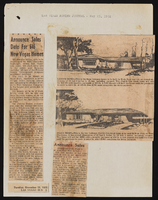Search the Special Collections and Archives Portal
Search Results

Transcript of interview with Joanna S. Kishner by Barbara Tabach, January 10, 2017
Date
Archival Collection
Description
Joanna Kishner epitomizes the native Southern Nevada who was raised in both a Jewish and secular world of Las Vegas. A daughter of Ellen Neafsey Jobes and Irwin Kishner, she was born in 1964 and graduated from Clark High School in 1982. As she recalls, the halls of Clark High School witnessed a stellar cast of characters in the early 1980s, from future casino executives, to additional judges, to comedian Jimmy Kimmel. Judge Kishner earned a double major in Political Science and Psychology from Claremont McKenna College (1986) and graduated from UCLA School of Law (1989.) She remained in California and worked as senior counsel for Warner Brothers, a division of Time-Warner Entertainment Company and was also an associate with the multi-national firm Paul Hastings Janofsky & Walker. In time, she felt the tug to return to her childhood roots in Las Vegas. She and her husband were married at Temple Beth Sholom, where she had her bat mitzvah and raises her own children in the Jewish tradition. Judge Kishner has been recognized for her legal work throughout the years, this includes pro bono work for disadvantaged children through the Children’s Attorney Project. When she set her sights on becoming a judge, she was joined by her young family as she knocked on thousands of doors to introduce herself and her passion for justice. In 2010, she was elected to Department XXXI of the Eighth Judicial District.
Text

Transcript of interview with Mary Ellen Campbell by Ronald Robinson, March 6, 1977
Date
Description
On March 6, 1977, Ronald Robinson interviewed Mary Ellen Campbell (born 1886 in Panaca, Nevada) about her life in Nevada. Campbell first talks about her parents’ move to the United States from England and her own life growing up in Panaca. She also talks about living in Pioche and the conditions of living in these two small Nevada towns. Also present during the interview is Mary’s grandson, Allen Campbell, who sometimes asks a few questions as well.
Text

Transcript of interview with Otto Merida by Claytee White, May 18, 2017
Date
Archival Collection
Description
When looking back on his legacy in the Latinx community of Las Vegas, Otto Merida (1945 - ) takes great pride in being a Latin Chamber of Commerce [LCC] co-founder with Arturo Cambeiro. With the LCC, they forged a powerful economic entity that continues to provide the local Latino community with social and political influence. Growing up during the 1950s in Havana, Otto Merida fondly remembers his childhood despite living under the dictatorship of Fulgencio Batista. There were the murmuring sounds of explosions from afar on the way to baseball games, but also the warm Sunday family meals of Cuban soup with fideos. In this interview, he talks about the rising communist powers inspired by revolutionary Fidel Castro and the events that led his family to place him in the Peter Pan Program in 1961. The Peter Pan Program sent unaccompanied Cuban children to the United States to avoid potential instruction by Castro’s government. Merida still holds on to his mother’s final request upon leaving Cuba-“I want you to remember the address where we live and the phone number: Josefina 68-entre primera y segunda-La Víbora, Havana con el teléfono X4304.” As a part of the Peter Pan Program, Merida experienced a nomadic childhood living in barracks in Miami and a three-story home in Wilmington, DE. The only connection he had to his family were a series of letters he exchanged with his mother, until they reunited years later in Miami. For Merida, life on 79th Street and Biscayne Boulevard in Miami was defined by the values of his family and other Cubans and African Americans in his neighborhood. v Merida earned his bachelor’s degree in Political Science from the University of Florida. He credits his sister-in-law with a pivotal role in his decision to pursue a higher education. His engagement in politics continued through his involvement with the Cuban Circle, the first Hispanic community to be involved with politics in Las Vegas. He describes the migration of Cubans to the casino scene of Las Vegas and the presence of Cubans in the community. His work with the Cuban Circle inspired him to develop a political presence for Hispanics in the community. While travelling across the United States before settling in Las Vegas, Merida made many significant relationships while working with associations such as the Fitchburg Chamber of Commerce and Volunteers in Service to America [VISTA]. Living in Las Vegas, Otto Merida worked as an educator and community organizer. In the late 1970s, Merida and Arturo Cambeiro collaborated to create the Latin Chamber of Commerce of Las Vegas. For Merida, the Chamber consistently goes above and beyond the vision he and Cambeiro had created when they first opened their doors. From the creation of the Latino Youth Leadership Program at UNLV to their work alongside political figures such as Senator Catherine Cortez-Masto, Merida is extremely proud of the various accomplishments of the Chamber. Now as President Emeritus, Otto Merida continues to dedicate himself to the Chamber as a volunteer and serves as one of the many Latinx Voices of Southern Nevada that have shaped the greater Las Vegas community.
Text

Transcript of roundtable interview with the Holocaust Resource Center: Myra Berkovits, Susan Dubin and Doug Unger, by Barbara Tabach, September 4, 2014
Date
Archival Collection
Description
Interview with Myra Berkovits, Susan Dubin and Doug Unger of the Holocaust Resource Center. In this interview, the group discusses the beginnings of what is now the Sperling Kronberg Mack Holocaust Resource Center. Edythe Katz-Yarchever is discussed as the catalyst for establishing the center and getting others involved with the Governor's Advisory Council on Education Relating to the Holocaust. Berkovits talks about her role as a liason for Holocaust education in the Clark County School District and the student-teacher conferences held each year with funding from Sheldon Adelson. Unger discusses expanding the outreach to the Washoe County School District with assistance from Atlantis Hotel (Reno, Nev.) owner, John Farahi and Judy Mack. They talk about the previous locations of the Holocaust Resource Center on Maryland Parkway, then Renaissance Drive, and the affiliation with the Jewish Federation and the Jewish Family Service Agency. After funding and personnel issues around 2011, the advisory council and the library went through a re-structuring and hired Susan Dubin who organized and catalogued the library collection. The library is now accredited by the Association of Jewish Libraries.
Text

Transcript of interview with Dr. John Shepherd by Lisa Gioia-Acres, November 21, 2008
Date
Archival Collection
Description
Dr. John Richard Shepherd shares the background of his early life in southern Illinois, his father's and grandfather's occupations, and his educational journey through college and medical school. His army experiences in Chicago and Alabama convinced him and his wife to look for a warm dry climate in which to live, and they relocated to Las Vegas in 1968. Dr. Shepherd recalls the businesses and housing surrounding Sunrise Hospital, the difficulties getting his specialty listed in the phone book, and renting his first office space from Nate Adelson. He also describes taking out a loan to install ophthalmology equipment, hiring an office manager with medical accounting experience, and doing cataract surgery in a way that basically hadn't changed for decades. The passing of the Medicare bill back in 1966 caused Dr. Shepherd's practice to build up quickly. He details the many ways eye surgery changed, including the invention of the intraocular lens and the phacoemulsification procedure. He mentions his and Dr. Shearing's contributions to ophthalmology — better designed lenses and surgical techniques - which they taught to other doctors from all over the country. Dr. Shepherd discusses radial keratotomy, which was a precursor to laser and later LASIK surgery, and describes a lens implant technique he learned in Russia from Dr. Fyodorov. He goes on to share anecdotes and stories of his interactions with patients, his travels as a consultant and as a surgical teacher for Project Orbis, and meeting Fidel Castro. He speaks candidly about his successes and his failures as well. Dr. Shepherd retired in 2006 and immediately enrolled in a Master's program and earned a degree in military history. After a long and distinguished career, after receiving many accolades and awards, he and his wife are enjoying life, splitting their time between Sun Valley, Idaho, and Las Vegas.
Text

Interview with Richard Van Nutley, November 8, 2004
Date
Archival Collection
Description
Text

Interview with Robert James Agonia, June 29, 2005
Date
Archival Collection
Description
Text

Sanje Sedera oral history interview: transcript
Date
Archival Collection
Description
Oral history interview with Sanje Sedera conducted by Kristel Peralta, Cecilia Winchell, Ayrton Yamaguchi, and Stefani Evans on April 16, 2021 for Reflections: The Las Vegas Asian American and Pacific Islander Oral History Project. Sanje Sedera discusses growing up in Sri Lanka, formerly Ceylon, with his family. He shares his educational history, moving from Sri Lanka to Darwin, Northern Territory, Australia as a high schooler to learn English before immigrating to the United States to attend Idaho State University. Sedera discusses the political unrest and civil war that took place in Sri Lanka between the Tamil and Sinhalese people, and how he grew to appreciate political activism instilled in him by his paternal grandparents. Sedera shares his employment history working as a manager for K-Mart, an opportunity that brought him to Las Vegas, as well as his entrepreneurial pursuits of owning a mortgage business and becoming a realtor. He talks about the financial crisis of 2008 that led to losing his business, his attempts to run for public office, and how he helped to form Nevada's Asian American Democratic Caucus. Sedera concludes with a discussion of his Buddhist practice and how these philosophies have shaped his life.
Text


